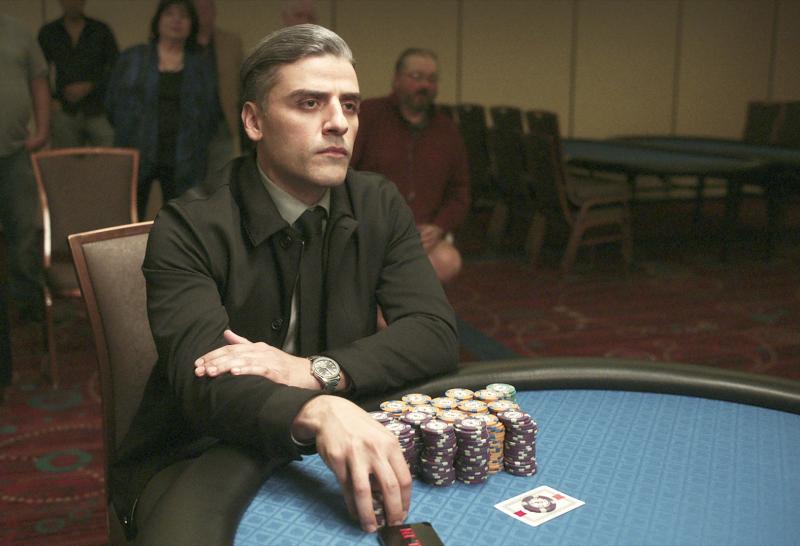Paul Schrader knows he has a limited number of films left, so whatever he does from here on out is going to be for himself.
At 75 years old, the writer of Taxi Driver and Raging Bull and director of American Gigolo and Mishima was even somewhat prepared to call it a day after his 2018 film First Reformed, for which he got his first Oscar nomination. He didn’t want to. He just knew it might be the reality.
“I thought I would go back to this character again for about the fifth time,” Schrader said in a recent interview. By “this character” he means “the man in the room.” It’s Travis Bickle. It’s John LeTour. It’s Julian Kay. And it’s a formula he’s been working with for 45 years.

Photo: AFP
“You get the general problem you’re dealing with and a unique metaphor and line them up,” he said. “If sparks start to fly, then you’re in business.”
In his new film The Card Counter, which premiered last week at the Venice International Film Festival and opens in Taiwan on Sept. 17, the problem is guilt and the metaphor is poker.
“Something I’ve been thinking about is how no one takes responsibility: I didn’t lie; I misspoke. I didn’t touch her inappropriately; I made a mistake. Everybody has an excuse,” Schrader said. “I came up with a Dutch Calvinist upbringing which was exactly the opposite: You were guilty before you were born, you were born guilty and you just kept getting guiltier. And you were responsible for everything, even the things you didn’t do! I thought it would be interesting to have a character who feels like that in our shifting sands of ethics and morality.”

Photo: AP
In The Card Counter his man in the room is Oscar Isaac’s William Tell, an austere poker player who travels around backwater casinos, staying under the radar and making sure to never win too much. He’s in self-imposed exile for his participation in Abu Ghraib.
The actor had a history with Schrader. Early in his career, Isaac auditioned for him in a black box theater in a strip mall in the Los Angeles neighborhood of Tarzana for a film that never came to be. But they stayed in touch a bit and he was the first-person Schrader went to with the script.
“I wrote right back. I couldn’t wait to do it with him,” Isaac said. “But when I first read the script, I didn’t really understand it. It was just so dark and there was something quite distant about it. I read it a second time and suddenly it started to come together for me a little bit more and I started to get a hit on the character. ... He made this character who has been punished by the state, and yet he leaves prison and feels that he hasn’t done enough penance. He’s decided to live an empty life as part of his own personal penance for what he’s done.”
And there was a particularly jarring image that Isaac was able to use to get into his headspace. Whenever William Tell goes to a new motel, he rearranges the room and covers every last piece of furniture in white sheets, meticulously draped and tied. Isaac even went back to his alma mater Julliard to do some “mask work” and go through the motions of making up a room in the way his character would.
“It’s not really ever explained,” Isaac said. “Is it because it looks like a jail to him, or because he needs neutrality because of all the time he spends in garish casinos? Is it because he’s planning something horribly violent?”
Schrader rounded out the cast with Tiffany Haddish, as a gambler’s agent who sees a potential moneymaker in Isaac, and Tye Sheridan as a kid with a grudge.
The experience has sparked something in Isaac, who has spent much of the last few years in big budget spectacles, whether it be Star Wars, X-Men, Dune or even the new Marvel series Moon Knight, which he’s been working on this summer, and, interestingly enough he’s doing with another Schrader veteran: Ethan Hawke.
“I’ve been assisting in putting these big stories on screen and playing my part as the trumpet or whatever, you know, in the big symphony of these things,” Isaac said. “To go back to this, which is the character study and such a complex character with one of the greatest character writers of all time, that really did, it reignited my passion for acting.”
As for Schrader? He’s at work on another story about a horticulturalist. And he’s singing the same song as after “First Reformed,” that this might be his last go.
“I hope it’s is not my last, but if it is, it’s a damn good one,” he said. “You hate to go out on a flat note.”

June 2 to June 8 Taiwan’s woodcutters believe that if they see even one speck of red in their cooked rice, no matter how small, an accident is going to happen. Peng Chin-tian (彭錦田) swears that this has proven to be true at every stop during his decades-long career in the logging industry. Along with mining, timber harvesting was once considered the most dangerous profession in Taiwan. Not only were mishaps common during all stages of processing, it was difficult to transport the injured to get medical treatment. Many died during the arduous journey. Peng recounts some of his accidents in

“Why does Taiwan identity decline?”a group of researchers lead by University of Nevada political scientist Austin Wang (王宏恩) asked in a recent paper. After all, it is not difficult to explain the rise in Taiwanese identity after the early 1990s. But no model predicted its decline during the 2016-2018 period, they say. After testing various alternative explanations, Wang et al argue that the fall-off in Taiwanese identity during that period is related to voter hedging based on the performance of the Democratic Progressive Party (DPP). Since the DPP is perceived as the guardian of Taiwan identity, when it performs well,

A short walk beneath the dense Amazon canopy, the forest abruptly opens up. Fallen logs are rotting, the trees grow sparser and the temperature rises in places sunlight hits the ground. This is what 24 years of severe drought looks like in the world’s largest rainforest. But this patch of degraded forest, about the size of a soccer field, is a scientific experiment. Launched in 2000 by Brazilian and British scientists, Esecaflor — short for “Forest Drought Study Project” in Portuguese — set out to simulate a future in which the changing climate could deplete the Amazon of rainfall. It is

The Taiwan People’s Party (TPP) on May 18 held a rally in Taichung to mark the anniversary of President William Lai’s (賴清德) inauguration on May 20. The title of the rally could be loosely translated to “May 18 recall fraudulent goods” (518退貨ㄌㄨㄚˋ!). Unlike in English, where the terms are the same, “recall” (退貨) in this context refers to product recalls due to damaged, defective or fraudulent merchandise, not the political recalls (罷免) currently dominating the headlines. I attended the rally to determine if the impression was correct that the TPP under party Chairman Huang Kuo-Chang (黃國昌) had little of a